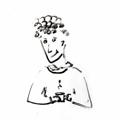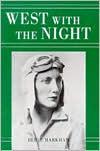ralentina reviewed West with the Night by Kingston, Beryl.
A book not about maps
5 stars
I bookmarked this book as 'to read' during the first months of my PhD, because it was quoted by Brian Harley. I finally brought myself to reading it last December, a few weeks after handing in my thesis. I'm very glad I did: not only it has nothing to do with maps (a definite plus at this point in my life), but it is a fascinating memoir, by a kick-ass woman who could handle not only horses and planes, but also words.
I have never been particularly affected by the mythology of pioneer pilots, but the book captures the magic of governing a plane, understanding how it works and how to make it fly, knowing the skies and the earth below, the dangers and the poetry of it:
'After this era of great pilots is gone, as the era of great sea captains has gone - each nudged aside by the march of inventive genius, by steel cogs and coppers discs and hair-thin wires on white faces that are dumb, but speak - it will be found, I think, that all the science of flying has been captured in the breadth of an instrument board, but not the religion of it'
I couldn't help but compare Makham's attitude towards Africa, natives and colonialists to those of Doris Lessing (I haven't read Karen Blixen, but that would be an even apter comparison). I'm not sure how to put it in a nuanced way, so I will just put it as it comes: Makham has very little white guilt. She is not crushed by her privilege - in the same way as she hardly pays notice to the sexism that she encounters as a woman pilot, which she seems to write off as misguided gallantry. Yet, she is not blind to how race and class shape her relations, particularly the one with her childhood friend Nandi. 'What a child does not know and does not want to know of race and colour and class, he learns soon enough as he grows to see each man flipped inexorably into some predestined groove like a penny or a sovereign in a banker's rack. Kibii, the Nandi boy, was my good friend. Arab Ruta, who sits before me, is my good friend, but the handclasp will be shorter, the smile will not be so eager on his lips, and though the path is for a while the same, he will walk behind me now, when once, in the simplicity of our nonage, we walked together'.
Perhaps this mix of confidence, insight and matter-of-factness comes with knowing, befriending and loving actual indigenous persons, rather than thinking of indigenous people as a group or a political identity. Kibii is a real child: funny, clever, sometimes arrogant, sometimes brave, sometimes pity. He is not a symbol for African children. Makham is not exactly indignant that racial relations mean they can no longer walk together in adulthood, though a certain sadness and disappointment transpires. Somehow, for me the result is a portrait of colonial relation that is more lively and nuanced, but not necessarily less revealing, than Lessing's denounce.
Makham's prose is rather poetic, and it was a long time since I had to look up so many words in a dictionary. Yet, as she makes beautifully underscores, she values clarity: 'I had nearly a thousand flying hours to my credit at he time and, if my eyesight had failed me during my preparations for the examinations, it would have been due to the additional hundred o two hours I spent studying navigation out of books whose authors must have been struck dumb in the presence of a one-syllabe word. Everything those authors said was sound and sane and reasonable, but they went on the theory that truth is rare than radium and that if it became easily available, the market for it would be glutted, holders of stock in it would become destitute, and gems of eternal verity would be given away as premiums'.

